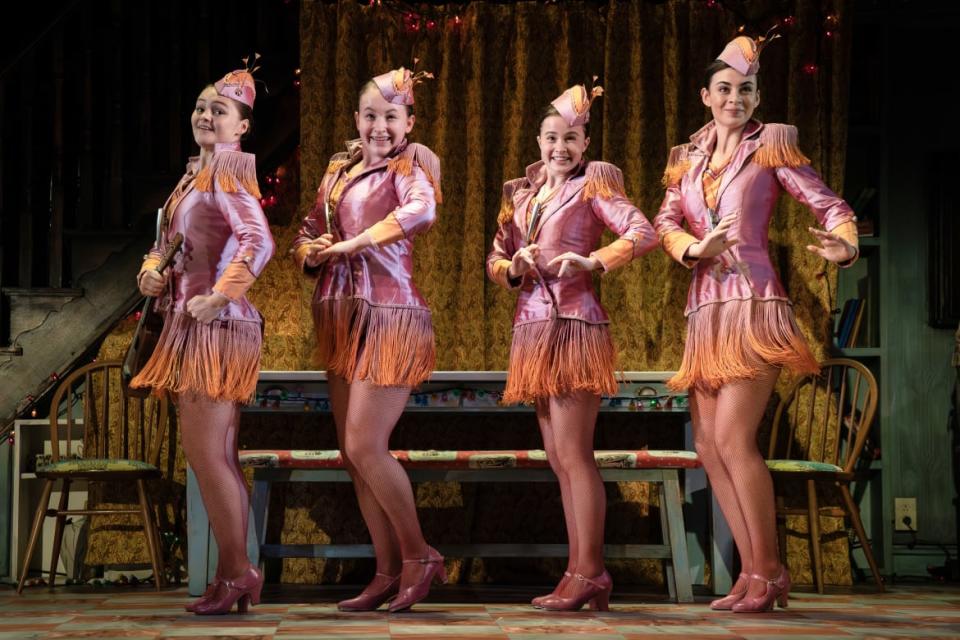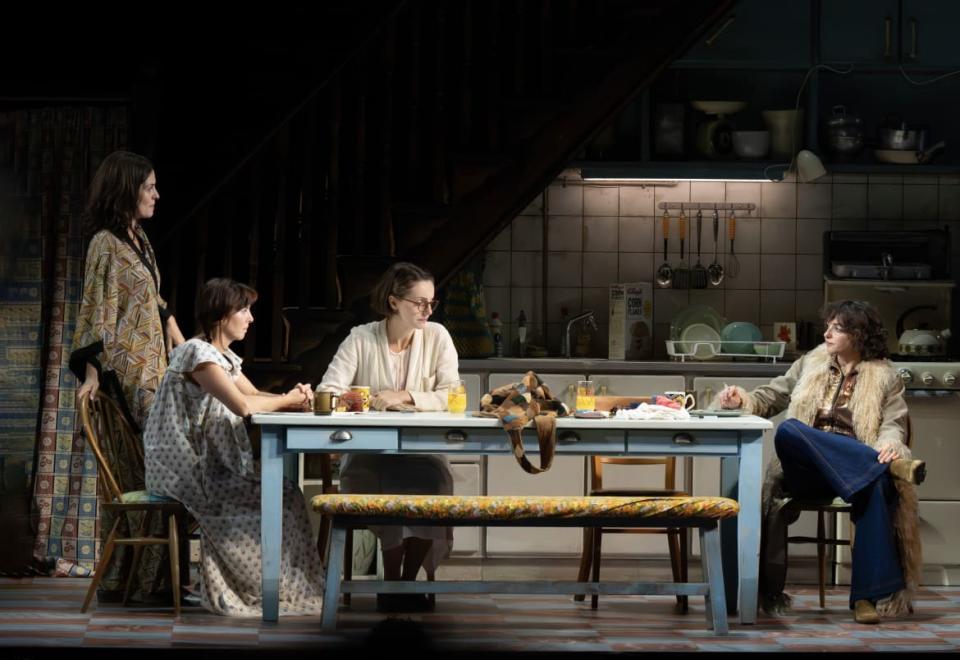What a mischievous title The Hills of California is. If it summons up images of West Coast luxe—or, more specifically, Lauren, Heidi, and Spencer—you may be surprised to find Jez Butterworth’s latest flawed and baggy Broadway play (Broadhurst Theatre, booking through Dec. 22) is set in its past and present day in the Gothic-shadowed, run-down gloom of the Sea View Guest House in the north-west England resort of Blackpool.
In the present day (1976) the infamous British heatwave of that year simmers outside, as unseen matriarch Veronica Webb dies in a room somewhere off a gloomy staircase. Her daughters—plain, dutiful Jill (Helena Wilson), free-spirited and sweet Ruby (Ophelia Lovibond), and serrated-sharp, embittered Gloria (Leanne Best)—await the arrival of prodigal daughter Joan (Laura Donnelly), who has long since flown the nest for a life of fame and mystery in America. You sense she will not be welcomed back entirely warmly.
Jez Butterworth’s ‘The Ferryman’ Sets a Gold Standard for Broadway Plays
In the past, the 1950’s, guesthouse owner and not to be defied stage-mom Veronica (also Donnelly) is training her daughters for Andrews Sisters-style singing stardom, and we see the early germination of the later bitterness. A visiting Hollywood agent, Luther St. John (David Wilson Barnes) takes a particular, indecent shine to Young Joan (Lara McDonnell). Veronica’s power is no match for his—and, in one of the most arresting scenes of the play, we see her power taken from her in a matter of seconds; her final act is to agree to literally prostitute her daughter.
In both past and present, both house and resort town have seen better times, and if the business enterprise is in a terminal state of decline but also defiantly hanging on so is the Webb family within. The title of the play takes its name from Johnny Mercer’s 1948 song—“You’ll settle down forever and never stray from the view/The hills of California are waiting for you”—and find an echo on stage because the Sea View guest house comes with no view of the sea. The property’s name, its inbuilt broken promise to guests, is the first sign of foreboding.
Rob Howell’s properly stunning set—the first proper wow-design of the new season—features a kitchen parlor and main lounge, but its wow is the staircases zig-zagging up into the gloom of the house and its unseen bedrooms, named surreally after American states. A typical run-down seaside guest-house would have nothing so grand—the staircases are more Downton than seedy guest house, but they perhaps hint in their outsized grandeur at the intended, epic sweep of the play, its meditation on fame and family pain, and the lost-and-found characters within.
The younger cast—Nancy Allsop (Young Gloria), Nicola Turner (Young Jill), Sophia Ally (Young Ruby), and McDonnell pair with their older incarnations as perfect personality precursors of the adults we meet later, even if Gloria’s rock-hard adult antipathy to Joan is yet to crystallize.
The play has been reportedly significantly rewritten since its London West End run, but it is still just over three hours, and unlike the Tony and Olivier Award-winning Butterworth’s memorable, deservedly award-winning plays (Jerusalem, The Ferryman), The Hills of California is a sludgy drag of a play, in which not enough happens, and not enough depth and grit examined, to merit such a grindingly long performance. If one had a brutal red pen in hand, the first act could be scythed completely; the play would rattle along better at just under two hours.


(l to r) Nancy Allsop (“Young Gloria”), Nicola Turner (“Young Jill”),Sophia Ally (“Young Ruby”), and Lara McDonnell (“Young Joan”) in ‘The Hills of California’.
Joan Marcus
If there are problems in the writing and correspondingly static direction (from Oscar, Tony, and Olivier-winning Sam Mendes), the performances are more solid and assured. Donnelly in both her guises is the motor of the show. As the mom in the 1950’s, we can see her ruthless determination to spur her daughters to fame, and in the scene where she sacrifices Joan, we see both her humiliation at St. John’s hands, and the inner, unspoken calculations—this is both Joan’s big chance, and the limits of her own ambition—that motivate her silent acquiescence to the abusive agent.
Later, Donnelly is unrecognizable—really, you’ll be checking your Playbills on the subway home—in the play’s final stretch, of which she is the very welcome dramatic focus, as the grown-up Joan, hair permed, hippy chick-isms flowing freely from her mouth, as she seeks to reconnect somehow with her past and sisters.
In her wide-eyed, drawling languor, she seems like the best kind of alien to Ruby, and the embodiment of all that has gone wrong for her main sister-adversary Gloria. Donnelly’s dual performance of two such different characters is an early award nomination waiting to happen (as she also received in London).


l to r: Leanne Best (“Gloria”), Ophelia Lovibond (“Ruby”), Helena Wilson (“Jill”), and Laura Donnelly (“Joan”) in ‘The Hills of California.’
Joan Marcus
Despite its faultless performances, the play suffers from too much subtlety and too much unsaid. We need to see the schisms, the evolution of bitterness and rivalries, to buy into their gravity and their long-lasting reverberations later on. We see so little of what happened in the 1950’s to wrench the family off its tracks that to make the leap to all the feverish bad feeling of 1976 feels too much of a conceptual leap.
Instead—and it sounds clunkily relayed from the stage—we get catch-up speeches from the sisters, which feel inadequate and rushed. Why not shave off some of the first act dead air, and write in some more sisterly dynamics? Why are the men—apart from Barnes’ ambiguously menacing St. John—so incidental, forgettable, and irritating?
The exuberance and colorfully dense patchwork of drama and humor of Jerusalem and The Ferryman is lacking in The Hills of California; instead, the production’s pace and precision are subsumed by the guest house’s shadowy gloom and that baking heat outside—adding to the components of the play we never see and, most importantly, never feel.
Get the Daily Beast’s biggest scoops and scandals delivered right to your inbox. Sign up now.
Stay informed and gain unlimited access to the Daily Beast’s unmatched reporting. Subscribe now.



